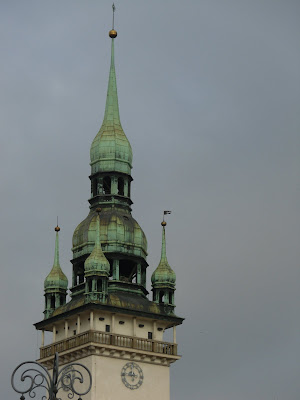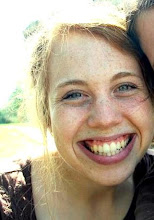When the Red Army began approaching, the Nazis got nervous and moved about 65,000 of the prisoners held at Auschwitz farther into the Reich. In the months preceding the liberation the Nazis began destroying many of the crematoria and trying to hide the rubble and burn the records. A week before the army arrived they evacuated another 2,000 prisoners by train and 59,000 by forced march. Nine to fifteen thousand of the prisoners died in these death marches, many in mass executions committed along the way. They left behind 9,000 in the camp to be executed, but 7,000 survived until the 26th, when the liberators arrived at the camp. I went to Auschwitz in December and despite my warm clothes, it was freezing. I can't imagine what it was like for those prisoners in January 1945. This is what the army saw when they arrived:

Pulling the story up to 2009, I arrived in the tiny train station at Oswiecim, Poland at 4:30 am. No one in the station spoke English. Darn. However, three Mexican students and a woman from Kazakhstan had gotten off the train as well and thankfully all spoke English and wanted to go to Auschwitz too. The woman from Kazakhstan, Aselya, and I started talking and became instant friends. Aselya deserves a whole story to herself, but let me just give you a glimpse of her.
Aselya Zelenina is from Kazakhstan. But she does not speak Kazakh, only Russian. And English (really really really really well). She is 26, I think. She is married to a guy from Kazakhstan who's ethnically Russian. She has traveled all over the world, some for her business job, but I think some just because her family and/or husband must have money. She is really sweet and confident and well-educated. She is worried about her country. Kazakhstan is increasingly coming under the influence of Iran, which has many dangerous implications, one of which is an increasing anti-Semitism (and anti-Americanism), including disregard for and even disbelief in the Holocaust (thank you Mahmoud Ahmadinejad). So Aselya is working on creating an informative web site about the Holocaust in Kazakh and Russian. She has hired a designer, her mom is helping her translate the Kazakh part, and she was going to Auschwitz to collect content and photos for the site. I admire the fact that she decided to actually do something about the problems that she saw; I admire that a lot.
Anyway, back to the story. We waited in the train station until it was light outside and then tried to navigate our way through town and out to the concentration camp based on a map I'd printed off Google back in the U.K. We made it and Aselya and I went on the incredible tour together with an English guide.
The summary of the day: everything you'd imagine visiting a death camp to be, but ten times more intense than you could have ever imagined. Visiting a concentration camp truly is something that everyone should do if they ever have the tiniest opportunity. It's heavy and aching and insane, but it's right to remember. My friend Luke reminded me that it is written in Ecclesiastes "It is better to go to a house of mourning than to go to a house of feasting... the heart of the wise is in the house of mourning."
A concentration camp doesn't feel like a place to take photographs. But I needed to remember. And I want you to be able to see in case you don't ever have a chance to go yourself.
This is the famous entrance to Auschwitz. Everyone's seen it in their history textbook. But it's real. And it's about the most twisted and grotesque motto you could imagine. Arbeit macht frei. Work makes you free.

Some of these brick buildings were used as dormitories, some as jails, some for medical experiments, and so on.

This is a courtyard of death between two buildings. Men and women were led out, lined up against the wall, and systematically shot. Their bodies were then dragged to a pile in the corner and the next round of people were marched out.

This is the gas chamber. You can see the crematorium smokestack rising from the top. This particular gas chamber was only used for one year, but in that year 60,000 people were killed in it. It is a haunting dark cellar into which thousands of people walked and from which they never emerged except as smoke.

Three kilometers from Auschwitz I is Auschwitz-Birkenau, which was built as a massive, efficient death center when the Nazis wanted more killing capacity than they could get at Auschwitz I. And it was certainly efficient. More than 20,000 people could be killed and cremated here every day. Every day. A set of train tracks enters Auschwitz-Birkenau at the front gates and continues all the way to the end of the camp, where the gas chambers and crematoria were located so that the cars that brought prisoners in, just like this one, could more efficiently transport them straight to the death chambers.

When the prisoner were brought into the camp, they were first sorted. About three fourths of them were sent immediately to the gas chambers. The other fourth that remained were those deemed fit for work, and they lived here at Auschwitz-Birkenau and watched the trains come in and the smoke pour from the crematoria, knowing that as soon as they became too weak to work they would join those sent to their deaths. The workers lived in rows of cabins lined up in the vast field that is Auschwitz-Birkenau. These are some of the bunks in one of the women's cabins. Four to five women would be crammed into each bunk.

No one really knows how many people died here. Records were destroyed, and families and entire communities were taken, leaving no one to remember. Estimates range from one to five million people. Which means that up to four million people were so effectively exterminated that not even a name remains.
The beginning of the memorial plaque at Birkenau reads: "Forever let this place be a cry of despair and a warning to humanity..."
But liberation came. And because of this, I have a shred of hope. That one day hatred, death, and brokenness will no longer have power. That we will be rescued. That this too will be made right.
"It is better to go to a house of mourning than to go to a house of feasting, for death is the destiny of every man; the living should take this to heart." Ecclesiastes 7:2













































